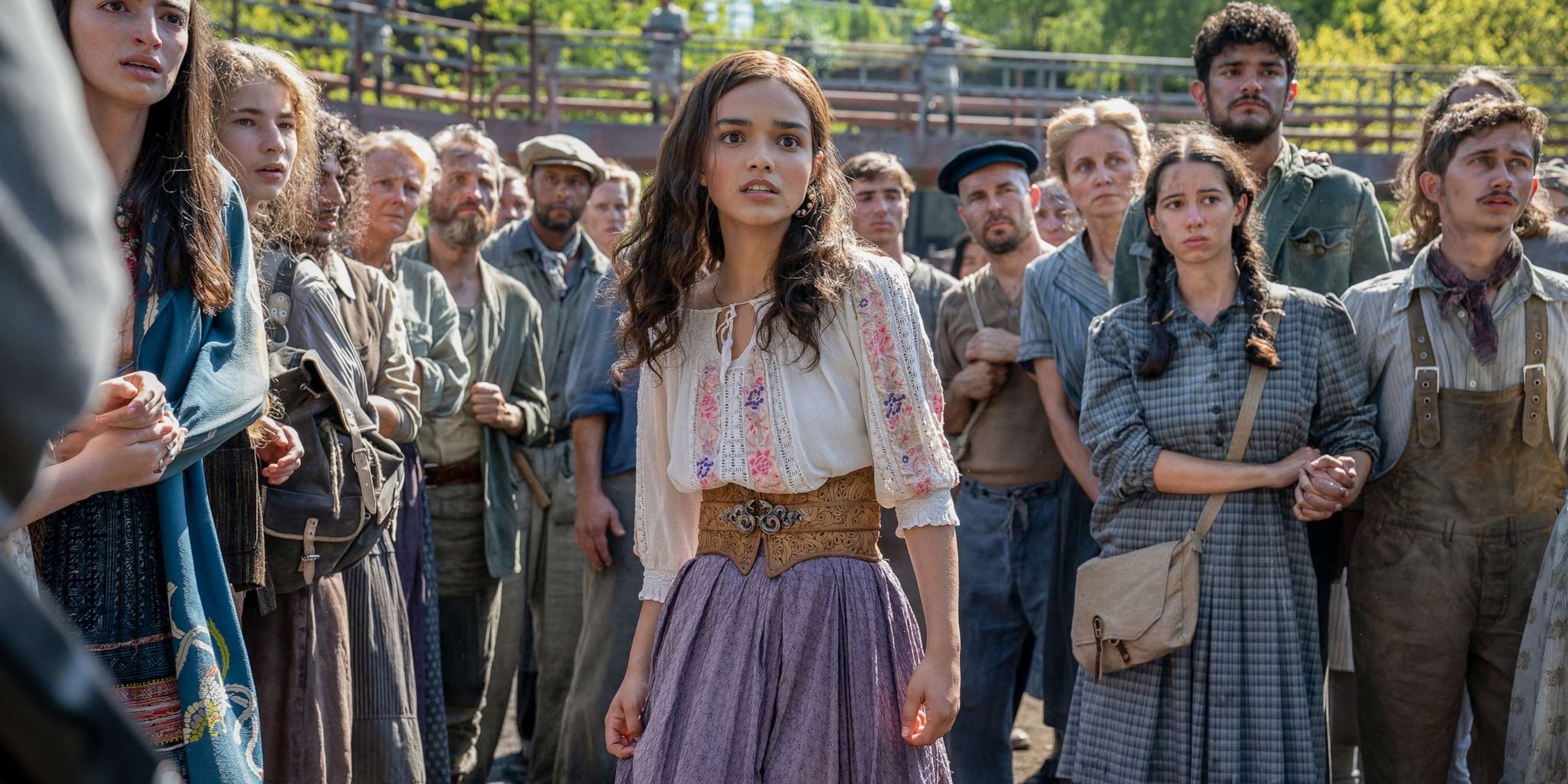Quick Links
- The Covey in The Hunger Games Trilogy
Despite being anything but a performer, music plays an important role in Katniss Everdeen’s life and personality. This, in addition to a fondness for the freedom of nature, are key traits of the Covey, a group that comes to prominence in The Ballad of Songbirds and Snakes. In many ways, the group is as mysterious to The Hunger Games world as the prequel’s protagonist Lucy Gray Baird herself. So what is the Covey?
When Lucy Gray is reaped as District 12’s female tribute in the 10th annual Hunger Games, she promptly bursts into defiant song. She then proceeds to deny any personal connection to District 12, despite living there at the time of the reaping. While Lucy Gray is clear that she is a member of the Covey, she offers no insight into any particular place where she lives or is from.
The Hunger Games: Why Isn’t Lucy Gray Mentioned In the Original Trilogy?
Katniss is not the only District 12 tribute to change the fate of Panem and Snow’s life. But why isn’t Lucy Gray acknowledged in the original trilogy?
What is the Covey?
The Covey is a free-spirited, traveling musical troupe. They see themselves as nomads, calling no particular district home, and in fact resenting being confined to any one place long enough to be mistaken as residents there. With no loyalty to the districts, the Covey remained neutral in the first rebellion, not taking a stand either way in the first war between the districts and the Capitol. Their original lack of animosity towards the Capitol makes their forced involvement in the Hunger Games even more insulting, which Lucy Gray subtly alludes to without jeopardizing her charm.
It’s Lucy Gray. And I’m not actually from 12. No, my people are Covey. We’re like a family. We’re musicians by trade, and we travel from place to place as the fancy takes us. At least we used to. Before the peacekeepers rounded us up.
The Covey’s forced involvement in the Hunger Games is far from the only instance of injustice the group faced from the Capitol. The group’s independence was a liability in the Capitol’s quest for all-encompassing control- a loose end, which Coriolanus Snow came to be very familiar with. Thus, the group bore the brunt of the Capitol’s violence, being sought out for hangings, beatings, and imprisonment. The Covey’s persecution left Lucy Gray an orphan, and she was far from the only one.
Where is the Covey From?
With the Covey’s insistence on having no loyalty to any person or place besides each other, it’s difficult to know where, specifically, they originated. The group did, however, originate somewhere in Panem. With no reference in their prided history to any particular district, it’s possible that the group has been around as long as the districts themselves, organizing alongside them and traveling throughout them as a completely independent entity- at least, before the Capitol seized control over them after the First Rebellion.
Despite their origins within Panem, it becomes clear throughout The Ballad of Songbirds and Snakes that the Covey are equally familiar with the wilderness beyond the country’s bounds as they are the civilization inside. When Coriolanus and Lucy Gray are reunited in District 12 after Lucy Gray’s victory in the Games, the two join the Covey on a secluded retreat outside Panem’s borders. The Covey expertly weaves their way through the forest, navigating to a pond that they are intimately familiar with- and no one else knows anything about. The Covey’s intimacy with the forest indicates the blow to their identity that came with the Capitol’s relegation of the group to the districts.
The Covey in The Hunger Games Trilogy
While neither Lucy Gray nor the Covey as a whole are mentioned in the original Hunger Games trilogy, their impact on Katniss’s timeline becomes readily apparent in The Ballad of Songbirds and Snakes. Any relation between Katniss and the Covey is unconfirmed, but similarities in values and personal history are undeniable. The character of Maude Ivory is introduced and revealed to be not only Covey, but Lucy Gray’s cousin in The Ballad of Songbirds and Snakes.
In The Hunger Games, Katniss sings the song “Deep in the Meadow” to Rue on her deathbed- a song that happens to be Maude Ivory’s favorite. Katniss resents her role of tribute for thrusting her into the spotlight (among more pressing reasons); she digs her heels into the ground to resist putting on any kind of show for the Capitol. This objection is a clear act of rebellion, but it also reveals a genuine discomfort with performance and attention. Nonetheless, Katniss will sing when she alone chooses to- usually in nature. Lucy Gray as well, despite her performing nature, declares: “I don’t sing when I’m told. I sing when I’ve got something to say“.
The importance of the song “The Hanging Tree” is also first introduced in The Hunger Games trilogy, and its Covey origin is confirmed in The Ballad of Songbirds and Snakes. Deducing any blood relation between the Everdeens and the Covey would be a theory at best, but the information revealed in the prequel that can be traced back to the original trilogy displays the Covey’s inarguable impact on the districts that remained strong generations after the events of The Ballad of Songbirds and Snakes.

The Hunger Games
In a Dystopian future, food has become the world’s most valuable resource, and children must fight to the death in a televised event in order to win resources for their home districts. When Katniss Everdeen volunteers to take her sister’s place, she sets in motion an uprising to change the world. Based on the hit YA novels by author Suzanne Collins, The Hunger Games quickly became a phenomenon with four star-studded movies based on the original series and a prequel, The Ballad of Songbirds and Snakes, released in 2023. The series has featured performances by Oscar winner Jennifer Lawrence, Donald Sutherland, Woody Harrelson, Peter Dinklage, and Rachel Zegler.


